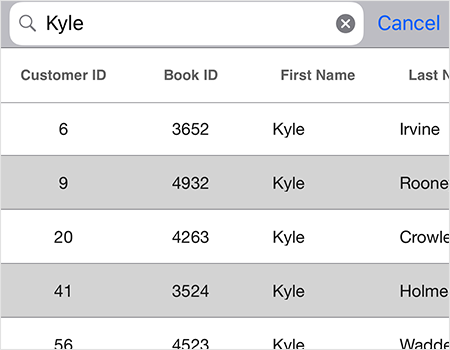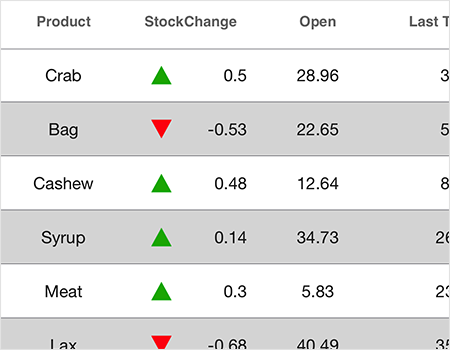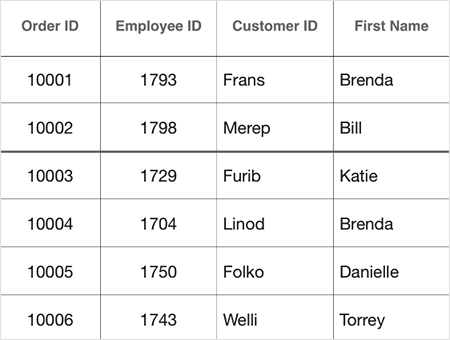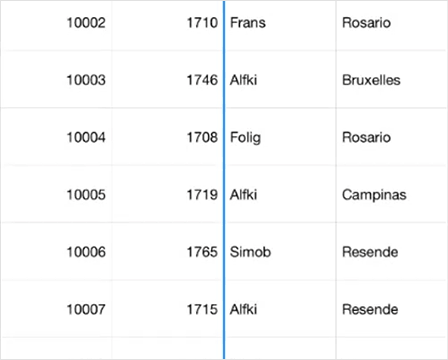
The Xamarin.iOS DataGrid is a high-performance grid control to display and manipulate large amounts of data efficiently in a tabular format. Its rich feature set includes functionalities like data binding, sorting, grouping, editing, filtering, swiping, dragging, resizing, loading more items, pull to refresh, and more. Export the entire DataGrid or selected items to Excel and PDF file formats using this control. It also handles high-frequency real-time updates.
The Xamarin.iOS DataGrid control was built from the ground up to achieve the best possible performance on the Xamarin platform, even when loading large data sets. Keep the data organized with both basic and advanced operations on cells, rows, and columns. Perform data processing operations like sorting, grouping, summaries, and real-time updates efficiently.

The Xamarin.iOS DataGrid has data-binding support that works out of the box for popular data sources like List, DataTable and ObservableCollection. Further, the control is completely MVVM compatible and has built-in commands for handling interactions in MVVM.


Sort data using conventional sorting techniques against one or more columns either by touch or programmatically. Apply custom sorting logic to order data when conventional techniques do not meet the requirement.

Group data by one or more columns programmatically with customizable templates. Groups can be expanded or collapsed. Apply custom grouping logic to group data.

Calculate and display sum, min, max, average, count, and custom aggregates for the entire DataGrid or individual groups to show the summarized information of all the data or just a section. The types of summary are:

Easily filter records by setting a predicate to the view to search for data that meets your requirements.

Handle high frequency updates where data is sorted and grouped in real time, even under the most demanding scenarios.



Load different types of data using various built-in column types such as text, numeric, date picker, combobox, picker, switch, and image for better data visualization.



Freeze rows and columns at the top and left positions in the view for better readability, similar to Excel. Horizontal and vertical scrolling can be performed except on fixed columns and rows.
In-place editing support with built-in column types provides the best editing experience. There is also built-in support for text, numeric, picker, and date picker editors with support to commit or roll back changes.

Associates swipe buttons with custom actions. Swipe buttons are displayed by swiping from left to right or right to left over a data row. Creates swipe templates and associates the views in them with custom actions.

Reorder rows and columns for additional end-user flexibility with column and row drag and drop.

Resize a column either on the move or on touch-up to read data larger than the cells. Restrict a column with a minimum width to avoid hiding the column and a maximum width to restrict resizing beyond the limit.



Create records on demand by automatically enabling data virtualization to efficiently process data.

Export the data to Excel and PDF formats with a variety of appearance customization options such as exclude specific columns, exclude headers, set custom row heights, set custom column widths, and more. A grid can also be exported to a particular page or position in a PDF document.

Scroll the data with the Xamarin.iOS DataGrid horizontally, vertically, or in both directions with various built-in scrolling modes: * Pixel: Scrolls the data for every pixel movement. * Pixel Line: Scrolls the data for every pixel and maintains the first record in view fully, like Excel. * Line: Scrolls the data based on the entire line movement.

 Documentation
Documentation
Greatness—it’s one thing to say you have it, but it means more when others recognize it. Syncfusion® is proud to hold the following industry awards.